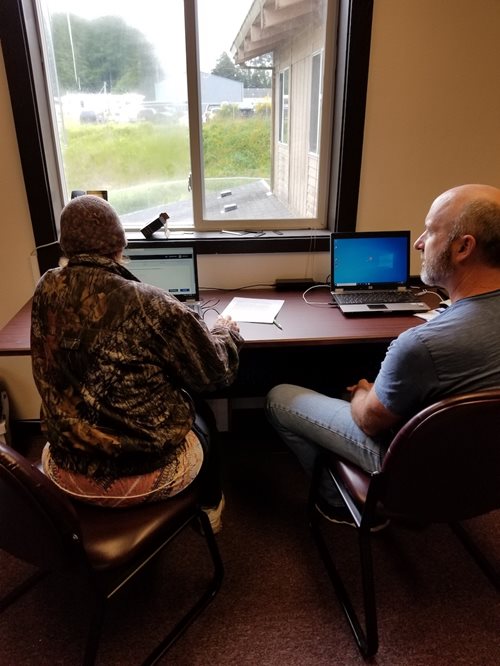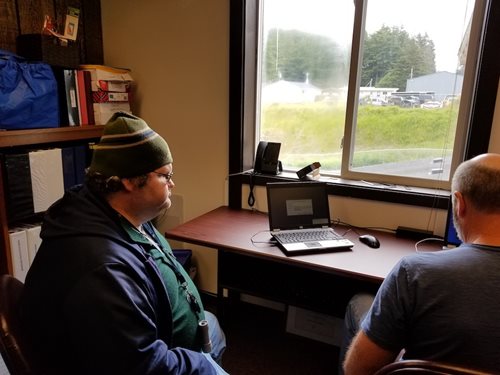Ruby Phillips was almost ready for her socially distanced appointment with the volunteers at NeighborWorks Umpqua in March, but she'd forgotten one of the documents she needed. They worked her in later that same day, she says.
"When you're late to a doctor's appointment, you usually have to reschedule," says Phillips, who lives in an apartment owned and managed by the NeighborWokrs organization. "But they got me in that day. You talk about surprised."
That wasn't her only surprise – or even the best one. Phillips doesn't normally file income tax forms, since her only income is social security and supplemental security income (SSI). But a volunteer with NeighborWorks Umpqua's Volunteer Income Tax Assistance (VITA) program helped her use a tool as a "non-filer" that would make her eligible for a stimulus check she hadn't known she could receive.
"I thought I was totally out of the water," she says. "But I'm not!"
Now she's watching her bank account, waiting for the welcomed boost. "The people there were so kind," she says of NeighborWorks Umpqua. "I got blessed with them."
As the tax season continues – it's longer this year, due to a postponed filing deadline – staff and volunteers at NeighborWorks Umpqua's VITA program also worked directly with homeless individuals in their community, who, like Phillips, were eligible for stimulus checks. As with other tax programs offered by NeighborWorks network organizations, NeighborWorks Umpqua's program is making a difference, says Michelle Martin, director of community and economic empowerment. She recounted the story of a man they'd helped at The Devereux Center, a day center for homeless people in Oregon.
 "He said he was planning to use the return to buy a car so he could get to work," she says. Unreliable transportation had often made him late, which was a factor in losing his job. A car would help him move to a more stable work situation.
"He said he was planning to use the return to buy a car so he could get to work," she says. Unreliable transportation had often made him late, which was a factor in losing his job. A car would help him move to a more stable work situation.
NeighborWorks Umpqua initially connected with The Devereux Center last year to help homeless individuals complete the U.S. Census. It was the first time they officially partnered for an event, though they'd worked together on an informal basis. At that time, they realized that homeless individuals in their community were eligible for stimulus checks but needed help with several steps before they could receive those checks.
First, they needed to file the non-filer forms with the Internal Revenue Service because they hadn't made enough money to owe taxes, says Tara Johnson, director of the center. They also needed a mailing address.
The Devereux Center allowed the homeless individuals to use the center's mailing address as a home address, something they'd done before with the Department of Motor Vehicles when an address was needed for an identification card.
"They were so excited," Johnson says. "To them, this was money that they'd never see or that was lost. They didn't know how to find it."
Staff from NeighborWorks Umpqua came in on Fridays to help. It had a snowball effect, says Johnson. "They were able to get the second stimulus payment and the third. It was a gift that kept on giving." Meanwhile, she says, the census information the individuals provided would be a help to the community for 10 years, establishing how much federal funding the community would receive for roads, schools, housing and other programs.
Johnson says some of the individuals used stimulus money to get new identification cards. Some used money to pay off debts, purchase vehicles or purchase cell phones so they could be in touch with family. "It's a tremendous thing for our community of people who are homeless and mentally ill," Johnson says. "It was as varied as what you or I would use the payment for. Some bought better camping equipment so they would be better equipped for sleeping outdoors. It ran the whole gamut as to how it enhanced the life of different individuals and their needs."
The Devereux Center provides laundry facilities, showers, and access to clothing to homeless individuals in Coos County. They help the community make and keep appointments with doctors and provide breakfast and lunch to 50 to 80 people a day. And now, with the help of NeighborWorks Umpqua, they've helped more than 100 of the most vulnerable individuals gain access to funds they would not have been able to access.
Martin says that the pandemic has led to a number of new partnerships for her nonprofit, something NeighborWorks organizations across the country have also found as they worked with food pantries and others to provide services they hadn't previously provided. The partnership with The Devereux Center was a way to expand what both organizations could do to help the community. It also led to new opportunities, providing technical support and leading to new grant applications. "It was a trigger for other projects that would not happen as easily, were it not for us engaging in these conversations," Martin says. "It was a really great partnership."
More than 40 NeighborWorks network organizations report helping individuals files taxes at no cost through programs like VITA. Some organizations reach out to older Americans, others to the general population. Some help dozens and some help thousands. But in each case, to the individuals who receive assistance, the programs are making a difference.
Further reading: Read this NeighborWorks research about the role of community development in preventing and ending homelessness.
04/14/2021

